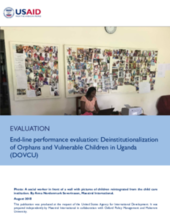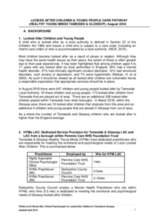Displaying 1151 - 1160 of 2221
The aim of this study is to examine whether youth in foster care receive services according to need, by using a multi-informant design.
This cross-sectional study uses a random sample of forty-six foster care alumni from a Midwestern public university to explore the relationship between exposure to trauma and post-secondary academic achievement.
This research investigated the prevalence of looked-after and adopted young people within a case file review of 185 young people referred to a UK gender identity development service over a 2-year period (1 April 2009 to 1 April 2011).
This report from the US Administration on Children, Youth and Families, Children's Bureau presents statistics and figures on foster care in the US for 2017, including the number of children in care disaggregated by age, sex, race/ethnicity, placement type, time in care, and more.
This study investigated two research questions: (1) Which child attributes and case histories are associated with placement disruptions (moves indicative of child, agency or caregiver dissatisfaction with the existing placement)?; and (2) How do associations of child attributes and case histories with placement disruptions vary by developmental stage --early childhood (0–5 years), middle childhood (6–12 years), and adolescence (13 years or older)?
The current studies used longitudinal data collected across 7 years from a sample of 1,765 children, 5 to 14 years old, in out-of-home care in Maryland, USA. This first study examined the trajectories of anxiety and depression across age and time in care separately and the second examined the reciprocal relationships across time between anxiety, depression, and significant risk and protective factors from Study 1.
This article analyzes secondary data collected from one of the most comprehensive longitudinal studies of foster youth.
The objective of this evaluation is to assess the performance of the “Deinstitutionalization of Orphans and Vulnerable Children Project in Uganda” (DOVCU) with regards to the creation of sustainable changes in the lives of two beneficiary groups, namely 43,000 vulnerable children living in targeted households and 2,000 children at risk as a result of an integrated package of support.
Findings from this study suggest that waivers may be a viable strategy for promoting higher education among foster youth.
This paper reviews the Healthy Young Minds (HYMs) program for looked after children in Tameside & Glossop, UK.



